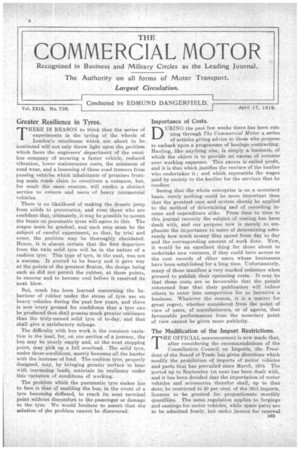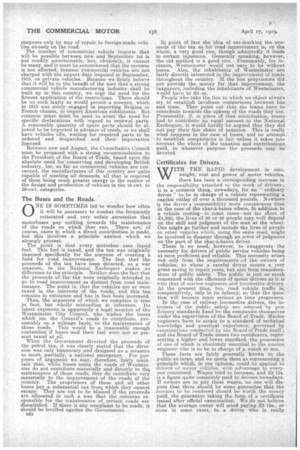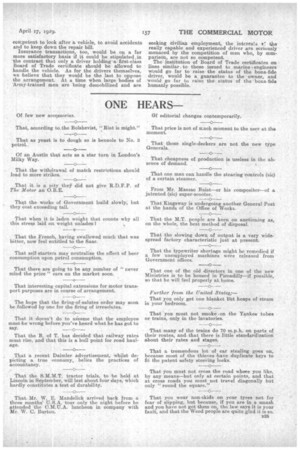Greater Resilience in Tyres.
Page 1

Page 2

Page 3

If you've noticed an error in this article please click here to report it so we can fix it.
THERE IS REASON to think that the series of experiments in the tyring of the wheels of London's omnibuses which are about to be instituted will not only throw light upon the problem which faces the engineers' department of the omnibus company of securing a faster vehicle, reduced vibration, lower maintenance costs, the minimum of road wear, and a lessening of those road tremors from passing vehicles which inhabitants of premises fronting main roads claim to constitute a nuisance, but, for much the same reasons, will render a distinct service to owners and users of heavy commercial vehicles.
There is no likelihood of making the drastic jump from solids to pneumatics, and even those who are confident that, ultimately, it may be passible to mount the buses on pneumatic tyres -will-agree to this. The stages must be gradual, and each step must be the subject of careful experiment, so that, by trial and error, the problem may be thoroughly elucidated. Hence, it is almost certain that the first departure from the twin, solid tyre will be in the nature of a cushion tyre. This type of tyre, in the past, was not a success. It proved to be heavy and it gave way at the points of the greatest flexion, the design being such as did not permit the rubber, at those points, to recover and to become cool before it received its next blow.
But, much has been learned concerning the behaviour of rubber -under the stress of tyre use on heavy vehicles during the past few years, and there is now every ground for confidence that a tyre can be produced that shall possess much greater resilience than the truly-named solid tyre of .to-day, and that shall give a satisfactory mileage.
The difficulty with bus .work is the constant variation in the load, for, an one section of a journey, the bus may be nearly empty and, at the next stopping point, may pick up a full overload. The solid tyre, under these conditions, merely becomes all the harder with the increase of load. The cushion tyre, properly designed, may, by bringing greater surface to bear with increasing loads, maintain its resiliency under this variation of conditions of working.
The problem which the pneumatic tyre maker has to face is that Of enabling the bus, in the event of a tyre becoming deflated, to reach its next terminal point without discomfort to the passenger or damage to the tYre. We Would hesitate to assert .that the aolution of the problem cannot be discovered.
Importance of Costs.
L.TRING the past few weeks there has been running through The Commercial Motor a series of articles giving advice to those who propose to embark upon a programme of haulage contracting. Hauling, like anything else, is simply a business, of which the object is to provide an excess of revenue over working expenses. This excess is called profit, and it is that which justifies the venture of the haulier who undertakes it ; and which represents the wages paid by society to the haulier for the services that he renders ' Seeing that the whole enterprise is on a monetary basis, surely nothing could be more important than that the greatest care and system should be applied to the method of determining and of recording income and expenditure alike. From time to time in this journal recently the subject of costing has been dealt with, and our purpose now is merely to emphasize the importance to users of determining mienrately how much money they spend from day to day and the corresponding amount of work done. Now, it would_ be an excellent thing for those about to undertake new ventures, if they could have access to the cost records of other users whose businesses have been established for a long time. Unfortunately, many of these manifest a very marked reticence when pressed to publish their operating costs. It may be that these costs are so favourable that the people concerned fear that their publication will induce others to enter into competition for so lucrative a business. Whatever the reason, it is a matter for great regret, whether considered from the point of view of users, of manufacturers, or of agents, that favourable performances from the monetary, point of view cannot be given more publicity.
The Modification of the Import Restrictions.
T. HE OFFICIAL announcement is now made that, after considering the recommendations of the Consultative Council on Iraports, the President of the Board of Trade has given directions which modify the prohibition of imports of motor vehicles and parts that has prevailed since March, 1916. The period up to September let next has been dealt with, and it has been decided that the importation of motor vehicles and accessories therefor shall, up to that date, be restricted to 50 per cent, of the 1913 imports, licences to be granted for proportionate monthly quantities. The same regulation applies to forgings and castings. for motor vehicles, while 'sPare Parts are to be admitted freely, but under licence for renewal
purposes only by way of repair to foreign-made vehicles already on the road. , The number of commercial vehicle imports that will be possible between now and September let is not .readily ascertainable, but, obviously, it cannot be many, andit must be remembered that the revenue is not affected, because commercial vehicles are not charged with the import duty imposed in September, 1915, on private vehicles. Because we firmly believe that it will be to the benefit of the user that a strong commercial vehicle manufacturing industry shall be built up in this country, we urge the need for the firmest application of the restrictions. There should be no such laxity as would permit a concern, which in 1913 was solely engaged in importing Belgian or French chassis, to import American substitutes. But common sense must be used to avert the need for specific declarations with regard to renewal parts. A reasonable quantity of spare parts should be allowed to be imported in advance of needs, or we shall have vehicles idle, 'waiting for required parts to be ordered and despatched and their importation licensed. ,
Between now and August, the Consultative Council must be prepared with a strong recommendation to the President of the Board of Trade, based upon the absolute need for conserving and developing British industry, for, so far as commercial vehicles are concerned, the manufacturers of this country. are quite capable of meeting all demands, all that Is required of them being much greater energy in the matter of the design and production of vehicles in the 15-cwt. to 30-cwt. categories.
The Buses and the Roads.
0 NE IS SOMETIMES led to wonder how often it will be necessary to combat the frequently reiterated and very unfair accusation that motorbuses pay nothing towards the maintenance of the roads on which they run. There are: of course, cases in which a direct contribution is made, but this involves a principle against which we strongly protest The point is that every motorbus uses liquid fuel. This fuel is taxed, and the tax was originally imposed specifically for the purpose of creating a fund for road improvement. The fact that the proceeds of the tax have been diverted, as a war measure, to the National Exchequer makes no difference to the principle. Neither does the fact that the proceeds of the tax were originally intended to go to road improvement as distinct, from road maintenance. The point is, that the vehicles are or were taxed in the interests of the roads, and this tax remains in existence and has in fact been increased.
Thus, the argument of which we complain is true in fact, but wholly misleading in inference. Its latest exponent is apparently a legal Member of the Westminster City Council, who wishes the buses which use the Council's roads to contribute, presumably on a mileage basis, to the maintenance of those roads. This would be a reasonable enough contention if buses 'and their fuel were not at present taxed at all.
When the Government diverted the proceeds of the petrol tax, it was clearly stated that the diversion was only temporary and designed as a measure to meet, partially, a national emergency. For purposes of argument we may, therefore, fairly maintain that, while buses using the roads of Westminster do not contribute materially and directly to the maintenance of those roads, they do contribute very materially to the improvement of the roads of the country. The proprietors of these and all other buses pay a substantial tax from, which they cannot escape. They are not to be blamed if the proceeds are allocated in such "a way that the concerns responsible for the maintenance of certain roads are dissatisfied. If there is any complaint to be made, it should be levelled against the Government. B24 In point of . fact the idea of ear-Marking the proceeds of the tax as for road improvement is, on the whole, a very good one, though admittedly it leads to certain injustices. Generally speaking, however, the old method is a good one, Presumably, for instance, Westminster would not care to be without bases. Also, the inhabitants of Westminster are fairly directly interested in the improvement of roads throughout the country. " If the bus proprietors did_ not provide the money for that improvement, the taxpayers, including the inhabitants of Westminster, would have to do. so.
People who take the line to which we object always try to" establish invidious comparisons between bus and tram. They point out that the trams have to contribute towards theaipkeep of the roads they use. Presumably, if, in place of that contribution, trains had to contribute an equal amount to the National Exchequer, it would hardly be argued that they did not pay their fair share of taxation. This is really what happens in the ease of buses, and no attempt to establish comparisons is fair unless it takes into account the whole of the taxation and contributions paid, to whatever purpose the proceeds may be devoted.
Certificates for Drivers.
WITH THE RAPID development in size, weight, cost and power of motor vehicles, there has been a corresponding increase in the responsibility attached to the work of drivers ; it is, a common thing, nowadays, for an "ordinary driver" to be in charge of a vehicle representing a capital outlay of over a, thousand pounds. Nowhere is. the driver's responsibility more conspicuous than in. the case of the char-h-hancs where, in addition to a vehicle costing—in some cases—not far short of 21,300, the lives of 30 or 40 people may. well depend on the skill and judgment of the man at the wheel. One might go further and include the lives of people on other vehicles which, "using the same road, might be involved in disaster through an erfor.of judgment on the part of the char-à-bancs driver.
There is no need, however, to exaggerate the necessity for drivers of public service vehicles being at once proficient and reliable. This necessity arises notonly from the requirements of the owners of vehicles, to whom a careful driver means a very great saving in repair costs, but also from considerations of public safety. The public is just as much concerned with the efficiency of motor drivers as it is with that of marine engineers and locomotive drivers. At the present time, too, road vehicle traffic is, comparatively, only in its infancy, so that the question will become more serious as time progresses.
In the case of railway locomotive drivers, the interests of the public safety are asaured by proficiency standards fixed by the :companies themselves under the supervision of the Board of Trade. Marine engineers have to attain to a standard of technical knowledge and practical experience, governed by examinations conducted by the Board of Trade itself ; and the Board of Trade issues two certificates, representing a higher and lower standard, the possession of one of which is absolutely essential to the marine engineer who is to be in charge of a watch at sea.
These facts are fairly generally known to the public at large, and we quote them as representing" a principle which, in our opinion, could be applied to drivers of motor vehicles, with advantage to everyone concerned. Wages tend to increase, and 23 15s. is a figure quite commonly paid to drivers nowadays. If owners are to pay these wages, no one will dispute that there should be some guarantee that the services to be rendered should be worth the money paid, the guarantee taking the form of a certificate issued after official examination. We do not belMve that the average owner will mind paying 23 15s., or more in some cases, to, a driver who is. really competent to look after a vehicle, to avoid accidents and to keep down the repair bill. Insurance transactions too, would be on a far more satisfactory basis 11 it could be stipulated in the contract that only a driver holding a first-class Board of Trade certificate should be allowed to handle the vehicle. As for the drivers themselves, we 'believe that they would be the last to oppose the arrangement. At a time when large bodies of Army-trained men are being demobilized and are seeking civilian employment, the interests al' the really capable and experienced driver are seriously menaced by the competition of men who, by oomparison, are not so competent.
The institution of Board of Trade certificates on lines similar to those issued to marine ;engineers would go far to raise the status of the bona-fide driver, would be a guarantee to the owner, and would go far to raise the status of the bona-fide humanly possible.






















